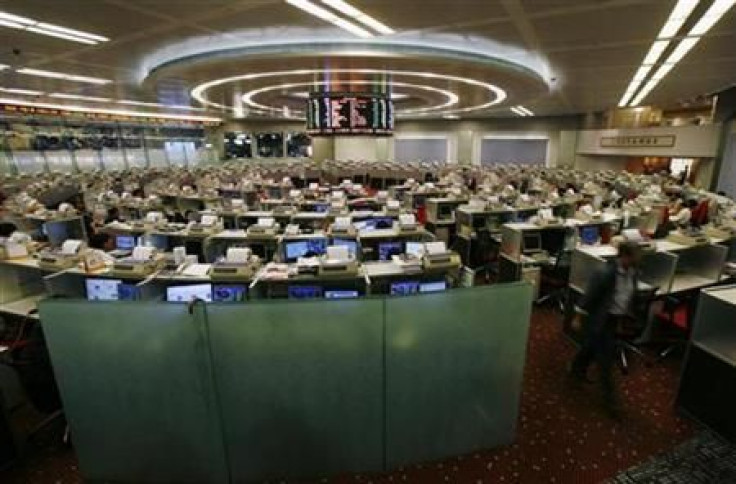Hong Kong exchange open to alliances, adds voice to merger

The Hong Kong stock exchange said on Thursday it will consider international alliances after Deutsche Boerse and NYSE Euronext announced plans to form the world's biggest trading powerhouse.
Deutsche and NYSE said they are in advanced talks to form a marketplace that would have annual trading volume exceeding $20 trillion, the latest in a flurry of mergers pointing to a shake-up of an industry under intense cost pressure from upstart electronic rivals.
Hong Kong Exchanges and Clearing Ltd, the world's biggest exchange operator by market value, said on Thursday it is open to international alliances and partnerships, although the exchange added that it had not identified any opportunities.
Due to changes in the financial market landscape, HKEx will consider international opportunities for alliances, partnerships and other relationships that present strategically compelling benefits consistent with its focus on markets in China, the exchange said in an email statement.
News Deutsche Boerse could be close to buying NYSE Euronext came shortly after the London Stock Exchange announced a bid for Canada's TMX.
The merger activity spurred a rally in shares of Australia's ASX, which is trying to overcome domestic opposition to a $7.9 billion takeover bid from the Singapore Exchange.
In contrast, HKEx shares fell on Thursday by the most in about three months on worries a round of mergers would intensify competition for the exchange. Shares dropped over 3 percent before the mid-day break.
HKEx has so far avoided any moves to merge because its strong pipeline of China-backed IPOs. Other exchanges in Asia have been reluctant to seek tie ups due to tight ownership and political obstacles.
The competitive threat from alternative trading pools makes strategic sense for traditional exchanges to combine resources so they can compete better, said Neo Chiu Yen, vice president for equity research at ABN AMRO Private Bank.
SGX's bid for ASX faces major political and regulatory hurdles in Australia, but investors said the latest deals appeared to strengthen the case for the tie-up.
Shares in both companies outperformed their respective wider markets on Thursday. ASX shares were trading up 4.5 percent, while SGX rose 1.3 percent.
Having seen so many mergers in the global market recently, Australia may better accept the prospect of being part of a larger group and it's paved the way for Australians to accept the reality of today's world, said Magdalene Choong, an analyst at Phillip Securities who has a buy rating on SGX.
REVIVAL
The takeover talks revive a wave of international exchange mergers last seen in 2006 and 2007.
The LSE's purchase of the Toronto stock market operator would make it the world's fourth largest and a top center for growth sectors of mining and energy, with $4.1 trillion of stock changing hands each year.
But that deal would be dwarfed by a Deutsche Boerse-NYSE Euronext merger, which would give it annual trading volume exceeding $20 trillion.
Deutsche Boerse and NYSE Euronext said they could cut costs by 300 million euros ($400 million) a year in a merger, though they added that no accord had been reached.
Aggressive, upstart trading venues have eaten deeply into the market shares of these traditional exchanges, forcing the Big Board, the LSE and others to invest heavily in trading technology and to look to higher-margin areas to grow.
The smaller players have really changed the face of these larger players around the world, and so they're forced to merge, said William Karsh, former chief operating officer at Direct Edge, one of two privately run U.S. venues that took on the New York Stock Exchange and Nasdaq in recent years.
While many analysts said the deals should bolster the case for a SGX-ASX merger, one analyst said the LSE could now be seen as an alternative partner for ASX.
LSE is clearly making a play on the mining-resources side of things and Asia is in general very resource hungry, so if Australia wasn't potentially tied-up with SGX, which isn't a done deal yet, that would be one option, said Niki Beattie, managing director of trading consultancy Market Structure Partners.
Both the Australian and London stock exchanges have traditionally attracted a significant number of resource companies to list, including heavyweights such as BHP Billiton.
Domestic Australian opposition to the SGX-ASX deal also remained, with the leader of Australia's powerful Greens party reaffirmed his strong opposition to the ASX-SGX tie-up.
If I was in New York I would be advocating that the stock exchange remains in American hands, Greens leader Bob Brown said.
(Additional reporting by Saeed Azhar, Kevin Lim and Rachel Armstrong in SINGAPORE, Sonali Paul in MELBOURNE)
© Copyright Thomson Reuters 2024. All rights reserved.











